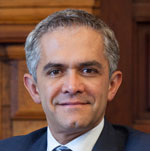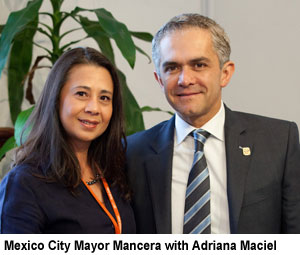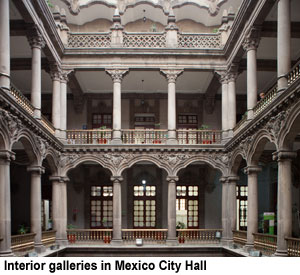
Miguel Mancera, Mayor of Mexico City

FRONT PAGE
About us
 

MAYORS OF THE MONTH
In 2015
Mayor of Seoul, South Korea (04/2015)
Mayor of Rotterdam, Netherlands (03/2015)
Mayor of Houston, USA, (02/2015)
Mayor of Pristina, Kosovo (01/2015)
In 2014
Mayor of Warsaw, Poland, (12/2014)
Governor of Tokyo, Japan, (11/2014)
Mayor of Wellington, New Zealand (10/2014)
Mayor of Sucre, Miranda, Venezuela (09/2014)
Mayor of Vienna, Austria (08/2014)
Mayor of Lampedusa (07/2014)
Mayor of Ghent, Belgium (06/2014)
Mayor of Montería, Colombia (05/2014)
Mayor of Liverpool, UK (04/2014)
Mayor of Pittsford Village, NY, USA (03/2014)
Mayor of Surabaya, Indonesia (02/2014)
Mayor of Santiago, Chile (01/2014)
In 2013
Mayor of Soda, India (12/2013)
Mayor of Zaragoza, Spain (11/2013)
Mayor of Marseille, France (10/2013)
Mayor of Schwäbisch Gmünd, Germany (09/2013)
Mayor of Detroit, USA (08/2013)
Mayor of Moore, USA (07/2013)
Mayor of Mexico City, Mexico (06/2013)
Mayor of Cape Town, South Africa (05/2013)
Mayor of Lima, Peru (04/2013)
Mayor of Salerno, Italy (03/2013)
Governor of Jakarta, Inbdonesia (02/2013)
Mayor of Rio de Janeiro, Brazil (01/2013)
In 2012
Mayor of Izmir, Turkey (12/2012)
Mayor of San Antonio, USA (11/2012)
Mayor of Thessaloniki, Greece (10/2012)
Mayor of London, UK (09/2012)
Mayor of New York, USA (08/2012)
Mayor of Bilbao, Spain (07/2012)
Mayor of Bogotá, Columbia (06/2012)
Mayor of Perth, Australia (05/2012)
Mayor of Mazatlán, Mexico (04/2012)
Mayor of Tel Aviv, Israel (03/2012)
Mayor of Surrey, Canada (02/2012)
Mayor of Osaka, Japan (01/2012)
In 2011
Mayor of Ljubljana, Slovenia (12/2011)
COUNTRY SECTIONS
Argentine Mayors
Belgian Mayors
Brazilian Mayors
British Mayors
Canadian Mayors
Chilean Mayors
Colombian Mayors
Czech Mayors
French Mayors
German Mayors
Italian Mayors
Japanese Mayors
Mexican Mayors
Spanish Mayors
US Mayors
Local government in the US

Worldwide | Elections | North America | Latin America | Europe | Asia | Africa |


 




 













|
|
Mayor of the Month for June 2013
Miguel Mancera
Mayor of Mexico City
Interviewed by Adriana Maciel
3 June 2013: When in December 2012, Miguel Ángel Mancera assumed the office of Mayor of Mexico City, it was inevitable that he would be compared to his two immediate predecessors. After all, both Manuel López Obrador (2000-2006) and Marcelo Ebrard (2006-2012) implemented radical changes in the city, often against strong opposition from traditional institutions. Both men also established themselves, nationally and internationally, as leading proponents of socially and environmentally progressive urban policies. But rather than regarding the legacy bestowed upon him as burden, Mayor Mancera views it as a solid foundation on which to build a city that can compete successfully with New York, Sao Paulo, London and Tokyo.
Following his visits to Spain and Italy, where he attended the inauguration of Pope Francis, City Mayors’ Mexico Fellow, Adriana Maciel, interviewed Mayor Mancera in his City Hall offices.
 City Mayors interviews City Mayors interviews
Mexico City Mayor Miguel Mancera
City Mayors: In March, you travelled to Europe for the first time as Mayor of Mexico City. Although your visit was brief, have you come back with any examples of good urban practice, which could be implemented here?
Mayor Mancera: Well, in Europe we found examples that we are now implementing in the city. I found a lot of attention is given to infrastructure - both in Italy and in Spain - a concern for public open space.
I saw distinct areas of opportunity in tourism. I think that tourism is one of the most important issues and is linked to everything else. If a city is not safe, does not cater for a variety of interests, does not offer opportunities and attractive public spaces and buildings, then hardly anyone will want to travel and visit it.
On my visit to Europe, I also noticed a strong concern for the environment, a concern also shared by Mexico City. I think that's one of the lines of work that we all must follow and worry about - green energy, caring for and improving the environment.
City Mayors: No doubt, many policies you encountered in Europe are already being implemented in Mexico City.
Mayor Mancera: Indeed, I witnessed, for example, good practices in fields of security, monitoring and continuous training, all areas where Mexico City also excels.
Public transport is a good example. In the past, when travelling, people sought to move by car. The competition used to be for the most modern and sophisticated motor vehicles. But now it is about public transport: a concern for having the best buses or the best pedestrian schemes.
The latter attracted my attention on a previous trip to Tokyo, a city, which is world-leading in integrating all forms of transportation and personal mobility. Mexico City seeks to have one of the most competitive mobility systems, allowing for different management options.
City Mayors: During your trip to Europe you met Ana Botella, the Mayor of Madrid. Could you establish areas of shared interest?
Mayor Mancera: Mayor Botella and I made a commitment to strengthen tourism between our two cities. We also discussed the city’s infrastructure. It caught my attention, for example, that in Madrid the authorities are not so interested in promoting cycling as they are in Barcelona. I saw hardly any bicycle parking spaces.
Madrid’s bus system is efficient and modern. However, the city has not invested as strongly as we have in Mexico City. For example, unlike with our Metrobus lines, Madrid just has bus stops at street level instead of segregated stations.
City Mayors: Many of the social policies of your predecessors were opposed by the Catholic Church. At your visit to Rome, did you get the impression that the Church under Pope Francis will become less conservative on social issues.
Mayor Mancera: I sensed a lot of optimism with the arrival of Pope Francis, especially great optimism and joy among Latin Americans. There was great enthusiasm, not only among Argentineans, but also among Catholics from other Latin American countries.
I witnessed Francis as a Pope with great vitality. Despite his age, but I realized that he is young in every sense. I also know he is loyal to his convictions. The good news for Mexico is that he is a fervent devotee of the Guadalupe Virgin and Saint Juan Diego. I learned that he instituted Saint Juan Diego as the patron of Florists in Argentina. So I see it as a good opportunity to have permanent contacts with Latin America and the Catholic Church.
 City Mayors: You are following in the footsteps of two illustrious predecessors. How is your relationship with Mexico City’s most recent former mayors Marcelo Ebrard and Andrés Manuel López Obrador? City Mayors: You are following in the footsteps of two illustrious predecessors. How is your relationship with Mexico City’s most recent former mayors Marcelo Ebrard and Andrés Manuel López Obrador?
Mayor Mancera: With both of them I have a cordial and respectful relationship, recognising all the work they did. Andrés Manuel López Obrador initiated the ‘Second Floors’ [new roads above one of the main innercity fast arteries] and the Metrobus system. If Marcelo Ebrard had not continued with this work, we would not have the means of transport that are now being implemented in this superhighway scheme and we would not have the Line 4 of the Metrobus.
Then, there are previous works that have to be accelerated. Mexico City itself asks for them. We now have the public space rescue programme. It is a target I have set myself. Here in front of the office we have just created a ‘pocket park’ [small and underused spaces being transformed into recreation places]. It was a space used for parking cars and today people are enjoying it. The recovery of public spaces is of fundamental concern to me. If you recover public spaces for people to use, you strengthen security and the fabric of urban society.
City Mayors: Former Mayor Ebrard maintained a high and prominent international profile due to his environmental policies and social activism. Are you going to follow his path or will you concentrate on domestic matters?
Mayor Mancera: I think the city needs to strengthen security; that is a fundamental topic. And yes, we’re going to promote social issues. We want to strengthen several of them. It is also important for people to witness the progress we make.
City Mayors: It sounds as though you want to develop your own style of governing.
Mayor Mancera: Yes, of necessity, and I regard this as a challenge.
I have introduced a new form of citizens participation - for example, on the voluntary handing in of guns.
It doesn’t mean that voluntary disarmament is peculiar to Mexico City. It is being practised in many cities. In fact, New York City Mayor Bloomberg has a introduced policies to encourage the return of privately held guns.
The difference is that Mexico City is working together with the Church. In the last three months we have already had almost 5,000 guns surrendered. The difference is that in the past, in other practices of this sort, up to 1,500 guns were collected in one year. I think that part of the success has to do with the collaboration of the Church, because this is carried out in places where people feel confident of handing in their guns.
City Mayors: What are your government’s priorities for your six-year term and what are the major problems you have to tackle?
Mayor Mancera: Security is permanently on the agenda. Another pressing issue is water.
We need to preserve water. We have to provide the city with more infrastructure on this issue and of course a major concern for us is to find new sources of supply for the city, because Mexico City currently depends to a large extent, at least 30 per cent, on the Cutzamala System. This means that if the Cutzamala System didn’t provide the city with the amount required, which increases day by day, we would have a serious problem.
The city has given the go-ahead for a exploratory well in Iztapalapa district. If the test detects a new aquifer, it could have the capacity to feed some 100 wells. This would account for at least 25 per cent of the city’s total water supply. In other words, it's an important amount in terms of supply capacity to the citizens, but another supply source is still required. We are going to analyse it together with the federal government. We have to come up with something this year because the project will take four years, so it must be done now. We have to work and decide between the State of Mexico, Veracruz or Hidalgo states to see where that water source is.
City Mayors: You just mentioned the federal government. How closely do you work with it and President Peña Nieto?
Mayor Mancera: We have a respectful and cordial institutional relationship. The topics and projects we have talked about are to benefit everybody. We have managed to reach agreement on education, which in Mexico City has always been postponed; we also have important agreements on health and security as well as on agricultural and economic areas. We are also discussing communications and transport infrastructure.
City Mayors: Would Mexico City benefit from constitutional reform?
Mayor Mancera: Right now, Mexico City is neither a state nor a city and its districts are nor reconised as municipalities. Historically, Mexico City has been an appendage of the federation.
The city administration was like a department and so it was the Department of the Federal District, which had a head of department. It was an administrative office of the federation.
That scheme was changed and then we had popular elections to choose a head of government, who has several limitations, many limitations, unlike state governors. Mexico City started to grow but differentiated from the states.
No constitutional proposals can be made by us and we cannot get involved in the discussions of the constitutional reforms either. If there is a programme for municipalities, our districts cannot participate. If there is one for the states, the Federal District cannot participate either. Currently, the mayor, in order to appoint the secretary of public security has to propose him or her, but the one who designates him or her is the president of the republic, and for the Attorney General it is somewhat similar, he or she is appointed by the mayor but has to be approved by the President.
City Mayors: How is Mexico City faring economically?
Mayor Mancera: Mexico City now wants to show itself as a city that reports its economic status. I have ordered both the Secretary of Economy and the Secretary of Finance to periodically draft a financial report of the city: the status of our debt and our spending; which are the niches of opportunity and the situation on competitiveness. How are we doing it?
We have invited IMCO (Mexican Institute for Competitiveness) through a covenant. As you know, IMCO is an institution, a private company that measures indicators. Then we want to know exactly what the city’s competitive situation is.
We have just signed an agreement with CANIETI (National Chamber of the Electronic and Telecommunications and Information Technologies Industry) for an approximate US$1.5 billion investment project over three years to change to 4G band. Some national companies and also some transnational corporations of international renown are going to make that investment. We want to transform Mexico City into an ‘Alpha City’, a city where there are transnational corporations, global companies, a well-defined niche of opportunity and a government that is more and more efficient.
What are we doing in this area, one of the most prominent areas on competitiveness? If a businessman is going to come to Mexico he will want to know how the government works. We want to do it more efficiently through digitization: a digital government, a government in the scheme of a Smart City. The city’s finances are healthy, we still have an 'AAA' credit rating, and I think Mexico City must never lose that category.
City Mayors: Why did you introduce tax rises at the beginning of your administration?
Mayor Mancera: The only tax rise was on car ownership, which was impossible to postpone.
City Mayors: And the property tax base?
Mayor Mancera: The property tax rise was an adjustment. The property tax, I believe, must be updated constantly. You find buildings, for example, in the ‘Condesa’ district, where the property tax is 300 pesos (25 dollars) per year. At that amount people are not contributing to the infrastructure they want. The tax issue is always unpopular but necessary, because if we hadn’t done it now, we could not be delivering the completely renovated high-speed ‘Periférico’ road.
City Mayors: Do you mean that much of that money is allocated to infrastructure?
Mayor Mancera: You have to spend it on public works, infrastructure. The citizens have to notice it. If they don’t notice any change, then they will complain. If we charge for car ownership I have to fix the sidewalks and the street-lights, for instance. Just yesterday we put to work more than 500 extra policemen because the citizens demanded more security.
City Mayors: Road safety is of major concern to many people,
Mayor Mancera: We are going to work intensively regarding traffic. First, we will reform the traffic rules because they have to be stricter. Second, we are going to enforce them with the use of surveillance cameras. We have 15 thousand cameras in the city, which should be exploited. We are going to be stricter about infringements and fines.
We will renew the traffic light system in the city. Currently you can arrive at a road junction at midnight where there is no traffic and where the red light lasts four minutes, whereas if we had a smart system the red light wouldn’t turn on if no one was coming from the other side.
City Mayors: Thank you for the interview.
|
|

|































 City Mayors interviews
City Mayors interviews City Mayors: You are following in the footsteps of two illustrious predecessors. How is your relationship with Mexico City’s most recent former mayors Marcelo Ebrard and Andrés Manuel López Obrador?
City Mayors: You are following in the footsteps of two illustrious predecessors. How is your relationship with Mexico City’s most recent former mayors Marcelo Ebrard and Andrés Manuel López Obrador?